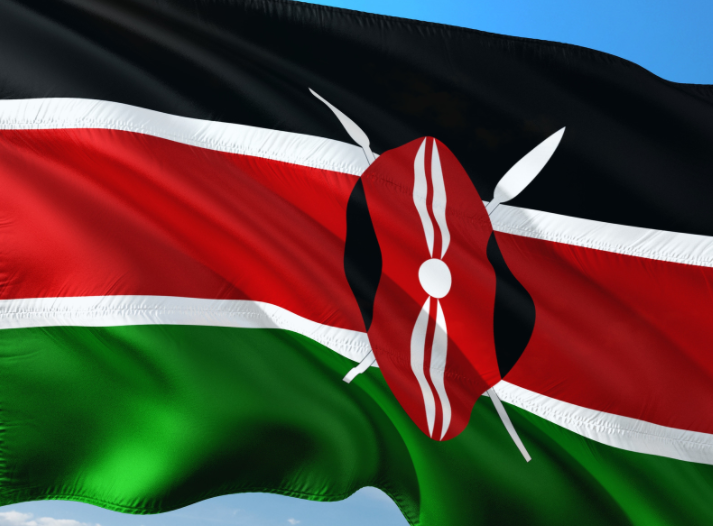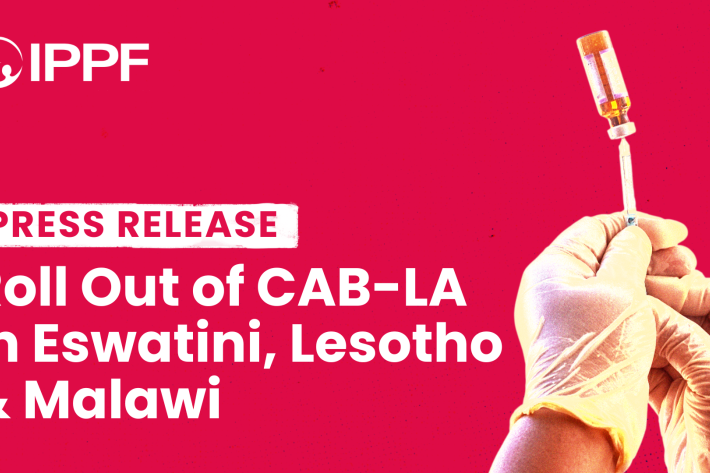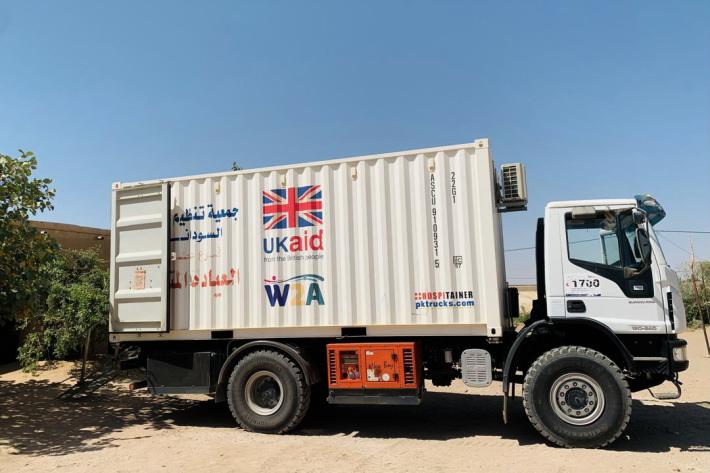Latest press releases
A selection of stories from across the Federation

Zambia, Tanzania, Kenya, Congo, Dem. Rep., Mali
Over 1.4 Million Women and Girls in Africa Left Without Contraception as U.S. Orders Destruction of Global Supply
For immediate release
For media enquiries
Telephone:
+44 7918 845944Email IPPF:
Email: media@ippf.org

| 05 August 2025
Over 1.4 Million Women and Girls in Africa Left Without Contraception as U.S. Orders Destruction of Global Supply
6 August 2025 - The International Planned Parenthood Federation (IPPF) has learned that over $9.7 million worth of US-funded contraceptives are now set to be incinerated in France. Seventy-seven percent of these essential supplies were earmarked for five countries in the Africa Region - including the Democratic Republic of the Congo (DRC), Kenya, Tanzania, Zambia, and Mali — many of which are already facing severe humanitarian crises. The incineration of these contraceptives will deny more than 1.4 million women and girls access to life-saving care. Rather than reaching the communities who need them most, these essential medical supplies - many of which don’t expire until 2027 to 2029 - are being needlessly and egregiously destroyed.IPPF Member Associations in the affected countries were due to receive a share of these contraceptive stocks. Instead, they are now facing a sharp decline in supply following the decision to incinerate them. More than 40% of the total value of the contraceptive stockpiled in Brussels was allocated for shipment to Tanzania alone. Dr Bakari Omary, Project Coordinator at UMATI, IPPF’s Member Association in Tanzania, said: “We are facing a major challenge. The impact of the USAID funding cuts has already significantly affected the provision of sexual and reproductive health services in Tanzania - leading to a shortage of contraceptive commodities, especially implants. This shortage has directly impacted clients' choices regarding family planning uptake.”This development adds a new layer of outrage to what is already a cruel political decision. These contraceptives were already manufactured, packaged, and ready for distribution. IPPF offered to take them for redistribution at no cost to the US taxpayer, but this offer was declined. The actions of the U.S. administration make it clear that politics trump economics, given the additional costs necessary for transportation, storage, and incineration of these products. “This decision to destroy ready-to-use commodities is appalling and extremely wasteful. These life-saving medical supplies were destined to countries where access to reproductive care is already limited, and in some cases, part of a broader humanitarian response, such as in the DRC. The choice to incinerate them is unjustifiable and undermines efforts to protect the health and rights of women and girls,” said Marie-Evelyne Petrus-Barry, Africa Regional Director of IPPF.IPPF's local partners in Africa will now face increased challenges to deliver essential and life-saving care. According to RHSC, the loss of these supplies is projected to result in 362,000 unintended pregnancies and 110,000 unsafe abortions: Tanzania: 1,031,400 injectable contraceptives and 365,100 implants will not be distributed. These products represent over 50% of USAID annual support to Tanzania's health system and a terrifying 28% of the total annual need of the country.Mali: 1,100,880 oral contraceptives and 95,800 implants will be denied, 24% of Mali’s annual need.Zambia: 48,400 implants and 295,000 injectable contraceptives will be denied to women.Kenya: 108,000 women will not have access to contraceptive implants, 13.5% of its annual need. Nelly Munyasia, Executive Director for the Reproductive Health Network in Kenya (IPPF Member Association): “In Kenya, the effects of US funding disruptions are already being felt. The funding freeze has caused stockouts of contraceptives, leaving facilities with less than five months' supply instead of the required 15 months; reduced capacity building for health workers; disrupted digital logistics and health information systems, and caused a 46% funding gap in Kenya’s national family planning program. These systemic setbacks come at a time when unmet need for contraception remains high. Nearly 1 in 5 girls aged 15–19 is already pregnant or has given birth. Unsafe abortions remain among the five leading causes of maternal deaths in Kenya.” Sarah Durocher, President of Le Planning familial (IPPF’s French Member Association): “We call on the French government to take responsibility and act urgently to prevent the destruction of USAID-funded contraceptives. It is unacceptable that France, a country that champions feminist diplomacy, has remained silent while others, like Belgium, have stepped in to engage with the US government. In the face of this injustice, solidarity with the people who were counting on these life-saving supplies is not optional: it is a moral imperative.”“We will not stay silent while essential care is destroyed by ideology”, continued Marie-Evelyne Petrus-Barry.Notes: IPPF’s local partners in the countries affected include Reproductive Health Network Kenya, Chama cha Uzazi na Malezi Bora Tanzania, Association Malienne pour la Protection et la Promotion de la Famille, Planned Parenthood Association of Zambia, Association Burkinabé pour le Bien-Etre Familial and the Association pour le Bien-Etre Familial/Naissances Désirables.For more information or to interview one of our staff, please contact media@ippf.org or +66628683089. About the International Planned Parenthood Federation IPPF is a global healthcare provider and a leading advocate of sexual and reproductive health and rights (SRHR) for all. Led by a courageous and determined group of women, IPPF was founded in 1952 at the Third International Planned Parenthood Conference. Today, we are a movement of 158 Member Associations and Collaborative Partners with a presence in over 153 countries. Our work is wide-ranging, and includes services for sexual health and well-being, contraception, abortion care, sexually transmitted infections and reproductive tract infections, HIV, obstetrics and gynecology, fertility support, sexual and gender-based violence, comprehensive sex education, and responding to humanitarian crises. We pride ourselves on being local through our members and global through our network. At the heart of our mission is the provision of – and advocacy in support of – integrated healthcare to anyone who needs it regardless of race, gender, sex, income, and, crucially, no matter how remote.

| 19 June 2024
IPPF Statement on the Ongoing Violence in Haiti
Haz click aquí para leer este posicionamiento en español The International Planned Parenthood Federation (IPPF) is deeply concerned about the escalating violence and political instability in Haiti, particularly its disproportionate impact on women and girls since March 2024. This crisis is expected to leave 3,000 pregnant women without essential medical care, leading to nearly 450 women experiencing life-threatening childbirth complications. With almost 580,000 Haitians displaced, women and girls are experiencing an alarming surge in sexual and gender-based violence (SGBV), including rampant sexual assaults, torture, and collective rape by armed groups. From January to March 2024, there were 1,793 SGBV incidents reported. Conflict-related insecurity has also significantly increased negative coping mechanisms, contributing to the rise in SGBV, as well as sexually transmitted infections and HIV. The ongoing violence is preventing access to essential sexual and reproductive healthcare services, endangering the lives of mothers and newborns. Our partner in Haiti, the Haiti Midwives Association, informed us, ‘the gangs prohibit the movement of motorcycles and pedestrians, threatening and sometimes shooting in the air to terrorise us further. Due to these difficult conditions, fewer and fewer patients are attending the hospital, whether for prenatal consultations, deliveries or postnatal care.” This inaccessibility has led to a significant increase in maternal and infant mortality. Eugenia López Uribe, Regional Director of the IPPF Americas & the Caribbean, said, “Humanitarian aid must be granted access through local organisations, such as our partner the Haiti Midwives Association, and their wellbeing must be guaranteed in this process. Women and girls can no longer wait! Our partner has provided access to vital emergency services such as pregnancy, childbirth and postpartum care, as well as care after sexual violence for 20 years. However, since February, they have been forced to stop their activities because of the imminent risks they face as women living in Port-au-Prince and surrounding areas.” On this International Day for the Elimination of Sexual Violence in Conflict, IPPF calls for zero tolerance toward any form of SGBV and demands the immediate protection of Haitian women, children, and those most at risk. We strongly call for unhindered humanitarian access to allow aid into Haiti. This aid must be designed and controlled by local NGOs and aid workers, and any foreign peacekeepers must safeguard and protect local communities - in particular their sexual and reproductive rights - so mistakes of the past are not repeated. Let’s not forget: Haiti's poverty and instability has been shaped by decades of foreign occupation and colonialism. The international community owes Haiti more than mere condolences; they owe an unwavering commitment to a future where human rights, including sexual and reproductive health rights are respected and protected, and nobody is left behind.

| 13 June 2023
Unmet need for contraceptives quadruples in parts of earthquake-affected Türkiye
The unmet need for contraceptives is estimated to have soared to nearly 50% in some parts of Turkiye, including Hatay province, following the earthquakes on 6 February 2023. This is a worrying trend, as the unmet need had already been on the rise from 6% in 2013 to 12% in 2018 in Turkiye. The Association of Public Health Specialists (HASUDER), IPPF’s local partner in Türkiye, is the only provider of contraception in some camps for internally-displaced persons (IDPs) following the devastating 7.8 and 7.6 earthquakes that killed more than 50,000 people in Turkey and displaced millions. Professor Bülent Kılıç, head of HASUDER, said that while government services are mandated to deliver contraceptive supplies to health clinics inside IDP camps, services have generally focused on pregnancy and birth services. He said: ”Physicians who provide contraceptive methods, including inserting intrauterine devices (IUDs) are rare or fully absent. There is no awareness about this service gap.” Kılıç also describes serious hygiene problems for women in the camps, where basic needs such as clean toilets and bathrooms are not being met. Kılıç continued: “We have seen that contraceptive services are only provided in gynaecology clinics in hospitals, and even then it is offered very little and only if requested. This issue is related to the government's perspective on women and women's rights.” HASUDER’s reproductive health unit, which was established with support from IPPF and Hatay Municipality in Lions and Mersin Municipality Tent City in Hatay, has been providing sexual and reproductive health services to 3,000 people since March 2023. These services include maternal and neonatal care, contraceptive care, safe abortion care, and counselling for sexual and gender-based violence. HASUDER is providing contraceptive methods including intrauterine devices, oral contraceptives and condoms, but reports that underwear, sanitary pads, birth control pills, emergency contraception pills and condoms are still among the most needed items for women. HASUDER has also reported a rise in unplanned pregnancies due to the dearth of contraceptives available. Violence against women and girls - already a serious issue in Turkey - is exacerbated in every humanitarian emergency, and persists in the IDP camps. IPPF estimates that 3.9 million women of reproductive age, over 175,000 pregnant women, and more than 1.2 million adolescent girls (aged 10-19) were affected by the earthquakes in Türkiye. We anticipate more than 8,700 currently pregnant women will experience delivery complications. For media enquiries, please contact media@ippf.org or Nerida Williams, Senior Humanitarian Communications Advisor, newilliams@ippf.org About the International Planned Parenthood Federation The International Planned Parenthood Federation (IPPF) is a global service provider and advocate of sexual and reproductive health and rights for all. For 70 years, IPPF, through its 118 Member Associations and seven partners, has delivered high-quality sexual and reproductive healthcare and helped advance sexual rights, especially for people with intersectional and diverse needs that are currently unmet. Our Member Associations and partners are independent organisations that are locally owned, which means the support and care they provide is informed by local expertise and context. We advocate for a world where people have the information they need to make informed decisions about their sexual health and bodies. We stand up and fight for sexual and reproductive rights and against those who seek to deny people their human right to bodily autonomy and freedom. We deliver care that is rooted in rights, respect, and dignity - no matter what.

| 28 March 2022
Kenyan High Court makes landmark ruling on safe abortion care
In a landmark verdict today, the High Court of Malindi has ruled that safe abortion care is a fundamental right under the Constitution of Kenya and that arbitrary arrests and prosecution of patients and healthcare providers, for seeking or offering such services, is completely illegal. Specifically, the Court ruled that: Abortion care is a fundamental right under the Constitution of Kenya and that arbitrary arrests and prosecution of patients and healthcare providers seeking or offering such services is illegal. Protecting access to abortion impacts vital Constitutional values, including dignity, autonomy, equality, and bodily integrity. Criminalizing abortion under Penal Code without Constitutional statutory framework is an impairment to the enjoyment of women’s reproductive right. For years, women and girls in Kenya have faced sustained and pervasive discrimination hampering their access to seeking reproductive healthcare services; the 1963 Penal Code criminalizes all abortion care, including those allowed under the Constitution 2010, which guarantees the right to healthcare, including access to reproductive health services. The Constitution only permits safe abortion if in the opinion of a trained health professional, there is need for emergency treatment, or the life or health of the mother is at risk/in danger. The court case in question, filed in November 2020, involved PAK, a minor 16 years of age from Kilifi County. PAK experienced complications during pregnancy and immediately sought medical care at a nearby clinic where a trained clinical officer attended to her. Upon examining her, the clinical officer determined that she had lost the pregnancy and proceeded to provide her with essential and life-saving post-abortion care. Policy officers stormed the clinic, in the midst of the treatment, stopping the medical procedure and confiscating PAK’s treatment records. They then proceeded to illegally arrest both PAK and the clinical officer. Both were taken to Ganze Police Patrol Base where PAK was not allowed to access further medical care for the next two days and was forced to sign a statement which was contrary to PAK’s description of the events. The police also forced PAK to undergo another detailed medical examination at Kilifi County Hospital to obtain evidence to prove the alleged offence of abortion. The clinical officer was detained for one week while PAK was remanded to a juvenile remand for more than a month, whilst she and her family sought to secure the cash bail for her release. The Malindi High Court has further directed the Parliament to enact an abortion law and public policy framework that aligns with the Kenyan Constitution. Additionally, the Court has confirmed that communication between a patient and the healthcare provider is confidential, which is guaranteed and protected under the Constitution and other enabling laws, save for where the disclosure is consented to by the patient or is in the public interest in line with the limitations as provided for in the Constitution. In its decision, the Court also ruled that PAK was recovering from medical procedure and police did not have the medical qualifications to determine and confirm that she was medically-fit to leave the clinic, regardless of her admission status at the clinic. Additionally, the Court found that PAK’s arrest was inhuman and degrading, and being a minor, she ought not to have been interrogated without legal representation. Marie-Evelyne Petrus-Barry, Africa Regional Director from the International Planned Parenthood Federation, said: “We are absolutely delighted to hear this news and applaud the High Court of Malindi's ruling confirming that abortion care is a fundamental right under the Constitution of Kenya and that arbitrary arrests and prosecution of patients and healthcare providers for seeking or offering such services is illegal. We are also very pleased to hear that the Court has directed Parliament to enact an abortion law and public policy framework that aligns with the Constitution. This is a victory for women and girls not only in Kenya, but across Africa! Access to quality abortion is essential to guarantee the health and reproductive rights of women and girls everywhere. At IPPF, we are committed to reducing the number of deaths of women and girls who are forced to turn to unsafe abortion methods for fear of arrests and harassment. We will continue to supply and support safe and legal abortion services and care for women and girls everywhere.” The petitioners were represented by the Center for Reproductive Rights a network of reproductive health providers whose member was the second petitioner in this case and a collaborative partner of IPPF. The advocates were Martin Onyango, Head of Legal Strategies for Africa, and Prudence Mutiso, Legal Advisor for Africa. Nelly Munyasia, Executive Director of Reproductive Health Network Kenya (RHNK), , welcomed the court’s decision: “Many qualified reproductive healthcare practitioners continue to be arrested, detained, and prosecuted for providing legal medical care. The court’s decision confirms that prosecution against health providers cannot hold where the prosecution has not established that; the health professional in question was unqualified to conduct the procedure; the life or health of the woman was not in danger or the woman was not in need of emergency treatment,” Ms. Munyasia said. Evelyne Opondo, Senior Regional Director for Africa at Center for Reproductive Rights said: “Today’s victory is for all women, girls, and healthcare providers who have been treated as criminals for seeking and providing abortion care. The court has vindicated our position by affirming that forcing a woman to carry an unwanted pregnancy to term or to seek out an unsafe abortion is a gross violation of her rights to privacy and bodily autonomy. Further, the continued restrictive abortion laws inhibit quality improvement possible to protect women with unintended pregnancies.” Center fact sheet: “The Impact of the Misalignment Between Kenya’s Constitution and the Penal Code on Access to Reproductive Health Care”
















